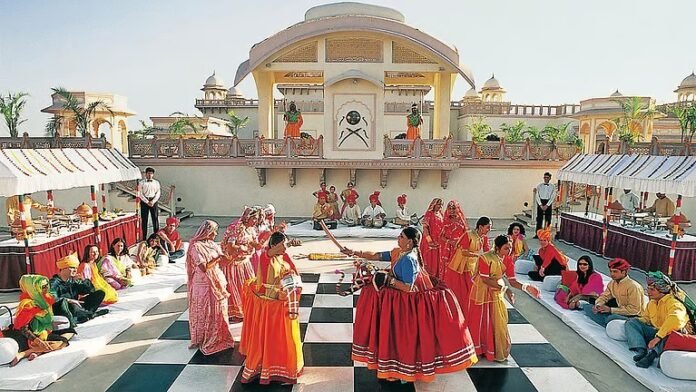Introduction
In Indian culture, hospitality is not a courtesy — it is a sacred duty. Rooted in the ancient Sanskrit phrase “Atithi Devo Bhava”, meaning “The guest is equivalent to God”, hospitality in India reflects a worldview where welcoming and caring for others is both moral obligation and spiritual practice. From village homes to urban hotels, from traditional festivals to modern tourism campaigns, the ethos of Atithi Devo Bhava runs deep. This concept demonstrates how Indian society views human connection: not as transaction, but as devotion.
Origins of the Concept
The idea of hospitality has its roots in the Vedic age (c. 1500 BCE). In agrarian and nomadic societies, guests often arrived without prior notice, sometimes traveling long distances. Hosting them with food, shelter, and respect was considered not only kind but sacred. The Taittiriya Upanishad clearly states: “Matru Devo Bhava, Pitru Devo Bhava, Acharya Devo Bhava, Atithi Devo Bhava” — honor your mother, father, teacher, and guest as divine beings.
This teaching placed guests alongside the most revered figures in society, embedding hospitality into moral and religious duty.
Hospitality in Practice: Everyday India
Hospitality in India often begins with food. Offering a guest water, tea, or a meal is seen as the minimum courtesy. Meals are often shared from what is available, reflecting generosity over abundance. Even in modest households, guests are treated with dignity and care.
Hospitality is also expressed in rituals. Before entering temples or homes, guests are welcomed with tilak (mark on the forehead), garlands, or sweets. In villages, travelers may be offered a bed or mat to rest on, even by families of limited means. The act is less about luxury and more about warmth and inclusivity.
Festivals and Hospitality
Festivals amplify India’s culture of hospitality. During Diwali, homes are lit with lamps not just for gods but to welcome visitors. Eid al-Fitr is marked by sharing food, with families distributing sweets to neighbors regardless of faith. Christmas celebrations often include inviting friends and neighbors to share meals.
These occasions highlight hospitality as social glue — strengthening bonds across communities and faiths.
The Spiritual Dimension
Hospitality in India goes beyond social etiquette; it is deeply spiritual. The guest is seen as carrying divine presence. Welcoming them with respect is thought to invite blessings into the household. Many traditions emphasize that mistreating a guest brings misfortune.
This belief is reflected in epic stories. In the Mahabharata, King Yudhishthira is tested on his ability to host unexpected guests, showing hospitality as a measure of righteousness. Similarly, in folklore, gods often appear disguised as ordinary visitors, testing human kindness.
Modern Adaptations: Tourism and Atithi Devo Bhava
In modern India, the phrase Atithi Devo Bhava has been adopted as a tourism campaign slogan, encouraging Indians to treat international visitors with the same traditional warmth. It reflects how ancient values are repurposed for contemporary contexts.
Luxury hotels incorporate traditional welcomes with garlands and tilaks, blending modern service with cultural symbolism. Homestays and rural tourism initiatives emphasize personal connection, offering guests not just accommodation but cultural immersion.
Challenges in Today’s Context
While hospitality remains strong, modern pressures sometimes strain this tradition. Urbanization and fast-paced lifestyles reduce time for unplanned visits. Rising individualism in cities can weaken the communal mindset that supports hospitality. Commercialization also risks turning Atithi Devo Bhava into mere marketing, stripping it of its spiritual depth.
Moreover, the expectation of treating guests as divine can sometimes place undue pressure on hosts, especially in lower-income households, where resources are limited. Balancing generosity with practicality is an ongoing challenge.
Counterpoint: Adaptation, Not Decline
Critics argue that globalization and modernization are eroding India’s traditional hospitality. Yet, one could argue that the spirit remains — only the form is changing. While urban families may not host guests for days as in the past, they express hospitality through shared meals at restaurants or digital connections. The essence of kindness and respect toward guests remains, even if lifestyles evolve.
The Broader Cultural Significance
Hospitality in India is not limited to personal homes. It extends to community and national identity. Indian weddings, for example, are famous for their scale and inclusivity — relatives, friends, and even distant acquaintances are hosted with elaborate care. Pilgrimage sites like Varanasi and Tirupati maintain large infrastructures to feed and shelter millions of visitors.
The culture of hospitality also reflects India’s philosophy of vasudhaiva kutumbakam — “the world is one family.” Treating guests as divine mirrors a broader worldview where kindness to strangers sustains harmony in society.
Conclusion
The concept of Atithi Devo Bhava embodies the Indian belief that hospitality is sacred. From Vedic scriptures to modern tourism campaigns, from modest village homes to global hotels, India has carried this tradition across centuries.
While modernization challenges some aspects, the spirit endures: treating others with warmth, generosity, and respect. Hospitality in India is not about luxury but about dignity, not about transaction but about devotion. In welcoming guests as divine, India reminds the world that true wealth lies not in possessions but in kindness.
References
Taittiriya Upanishad (translated texts).
UNESCO (2023). Intangible Cultural Heritage: Indian Social Practices.
Ministry of Tourism, Government of India (2021). Atithi Devo Bhava Campaign Report.
The Hindu (2020). “Hospitality as Spiritual Practice in India.”
BBC Culture (2021). “How Indian Traditions Shape Tourism.”








